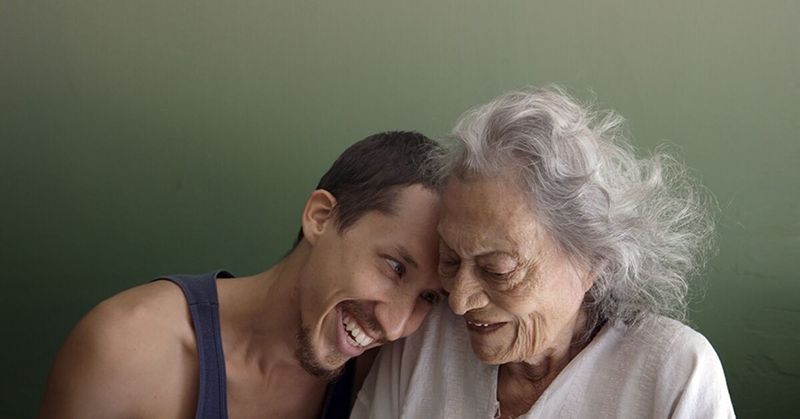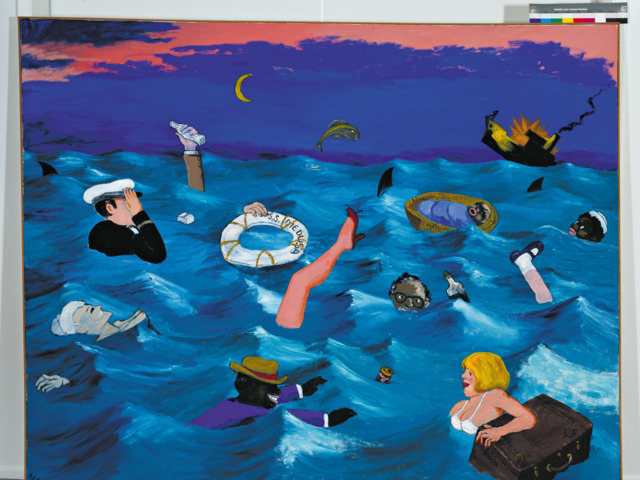
Warmly intimate and authentic, América hones in on the lives of three Mexican brothers — Diego, Rodriguez and Bruno — who become caretakers for the documentary film’s namesake, their 93-year-old grandmother. This comes after their father, Luis, is jailed for accusations of elder neglect, América having fallen from her bed while he was away.
From tense conversations between the siblings — which, at times, broil to outright anger — to tender moments of care, América allows viewers to be entirely immersed in the complexities of its subjects. And it does so with an effortless delicacy carried frame-to-frame.
Directed by Wright State University alumni Erick Stoll and Chase Whiteside — the former now lives in Cincinnati, the latter in New York City — the feature manifested as happenstance and was shot over the course of three years. Since its premiere in 2018, América has garnered praise from The Guardian, Time Out London, The New York Times and more. Come Oct. 3, the doc will be screened as part of the Over-the-Rhine International Film Festival at the Contemporary Arts Center. And on Oct. 7 a shortened 60-minute version will be broadcast on PBS as part of their documentary series POV.
In a recent interview with Stoll, he told me that the film’s origins stemmed from a project focusing on the tourism industry. It was during this time that he met Diego at a party, their connection immediate. After being kicked out of his apartment, Diego — who worked as an entertainer in the coastal Mexican resort town of Puerto Vallarta — came to live with Stoll briefly.
“Then, as is revealed (in the film), this whole thing happens with América and Luis, his dad, and he just really quickly had to go home,” Stoll says. “I didn’t follow him right away. It was maybe a few weeks later when things had stabilized there a little bit.”
Without the intention of filming, Stoll says he brought his gear and went to Diego’s hometown of Colima. Upon meeting América, he was taken by the relationship between her and Diego.
“I’ve never seen — or rarely seen — intergenerational intimacy like that, especially with a young man,” Stoll says. “More broadly, I was just really moved and intrigued by this project of all these young eccentric people being like ‘Let’s all live together and take care of our grandmother.’ ”
Stoll lived with the family for the next few years, on and off, filming what would become América. In that time, he captured the brothers’ highs and lows of caring for their matriarch, who had dementia. The film shows the daily grind of this process — helping her walk to regain strength, quiet moments of conservation, bathing her, quarreling about how to best care for her and, in one scene, administering an enema. Though his physical presence is imperceptible, Stoll’s empathy renders itself beautifully to the screen.
“I don’t purport to know how it felt for them to have gone through the same thing that they did, but I experienced a lot of it really closely,” Stoll says. “The joys of seeing América get better — because she was getting better under their care — (and) the relief of Luis finally getting out of jail after bribing the judge.”
At one point Stoll took a step back in filming because he felt too close to the situation. As a collaborator, Stoll says Whiteside, who wasn’t as present during filming, was essential in the editing process in that he was able to lend a detached perspective.
“I was so invested in every character, every complexity, that I think if I had tried to edit alone I would have still been working on it or I’d have an eight-hour film or something,” Stoll says, adding that there’s a process akin to sculpting when distilling so much footage into a 76-minute feature.
The film closes with a “two years later” epilogue. Diego and Bruno hold a ceramic container to their chests, containing what is assumed to be their grandmother’s ashes. They laugh and cry together, leaving us with a summation of América — a study in coming to terms with our own humanity.
América screens at the Contemporary Arts Center as part of the Over-the-Rhine International Film Festival on Oct. 3 (3-4:35 p.m.); visit otrfilmfest.org for details. The film airs on PBS’s POV on Oct. 7 at 10 p.m.; check amdoc.org for info.






